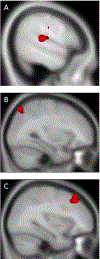Insular resting state functional connectivity is associated with gut microbiota diversity
- PMID: 30554441
- PMCID: PMC6697239
- DOI: 10.1111/ejn.14305
Insular resting state functional connectivity is associated with gut microbiota diversity
Abstract
The gut microbiota has recently gained attention as a possible modulator of brain activity. A number of reports suggest that the microbiota may be associated with neuropsychiatric conditions such as major depressive disorder, autism and anxiety. The gut microbiota is thought to influence the brain via vagus nerve signalling, among other possible mechanisms. The insula processes and integrates these vagal signals. To determine if microbiota diversity and structure modulate brain activity, we collected faecal samples and examined insular function using resting state functional connectivity (RSFC). Thirty healthy participants (non-smokers, tobacco smokers and electronic cigarette users, n = 10 each) were studied. We found that the RSFC between the insula and several regions (frontal pole left, lateral occipital cortex right, lingual gyrus right and cerebellum 4, 5 and vermis 9) were associated with bacterial microbiota diversity and structure. In addition, two specific bacteria genera, Prevotella and Bacteroides, were specifically different in tobacco smokers and also associated with insular connectivity. In conclusion, we show that insular connectivity is associated with microbiome diversity, structure and at least two specific bateria genera. Furthemore, this association is potentially modulated by tobacco smoking, although the sample sizes for the different smoking groups were small and this result needs validation in a larger cohort. While replication is necessary, the microbiota is a readily accessible therapeutic target for modulating insular connectivity, which has previously been shown to be abnormal in anxiety and tobacco use disorders.
Keywords: fMRI; electronic cigarette; insula; microbiome; tobacco.
Published 2019. This article is a U.S. Government work and is in the public domain in the USA.
Conflict of interest statement
Statement of Interest
The authors report no conflicts of interest.
Figures




References
-
- Benjamin JL, Hedin CR, Koutsoumpas A, Ng SC, McCarthy NE, Prescott NJ, Pessoa-Lopes P, Mathew CG, Sanderson J, Hart AL, Kamm MA, Knight SC, Forbes A, Stagg AJ, Lindsay JO & Whelan K (2012) Smokers with active Crohn’s disease have a clinically relevant dysbiosis of the gastrointestinal microbiota. Inflammatory bowel diseases, 18, 1092–1100. - PubMed
-
- Bercik P, Collins SM & Verdu EF (2012) Microbes and the gut-brain axis. Neurogastroenterology and motility : the official journal of the European Gastrointestinal Motility Society, 24, 405–413. - PubMed
-
- Biedermann L, Zeitz J, Mwinyi J, Sutter-Minder E, Rehman A, Ott SJ, Steurer-Stey C, Frei A, Frei P, Scharl M, Loessner MJ, Vavricka SR, Fried M, Schreiber S, Schuppler M & Rogler G (2013) Smoking cessation induces profound changes in the composition of the intestinal microbiota in humans. PloS one, 8, e59260. - PMC - PubMed
Publication types
MeSH terms
Grants and funding
- McNair Medical Institute/International
- Toomim Family Fund/International
- Pilot Award from the Core for Advanced MR Imaging at Baylor College of Medicine/International
- P30 CA125123/CA/NCI NIH HHS/United States
- 19295/NARSAD/International
- I01 CX000994/CX/CSRD VA/United States
- VHA5I01CX000994/the Veteran Health Administration/International
- R03 DA029167/DA/NIDA NIH HHS/United States
- K01 DA026539/DA/NIDA NIH HHS/United States
- DA09167/National Institute of Health/International
- DA026539/National Institute of Health/International
- 5P30CA0125123/BC/NCI NIH HHS/United States
LinkOut - more resources
Full Text Sources

